Fukaki Woollen Textile Co. has a Specialist History of over 130 years developing Woollen Textiles in Japan.
1887
Founded on the auspicious Day of the Boar in November The spinning of cotton and weaving of braids began as a side business for a farmer, making use of a location near the cotton trading center of Sakai
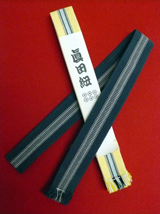
Our company began by weaving Sanada-braids as a side business for a farmer in 1887, using a location near the cotton trading center of Sakai. It is said that this began on the Day of the Boar in November. (source: Sanadaan in Kishu Kudoyama)
1892
Sanada cloth textile mill and rice granary rebuilt and manufacturing begins with a blanket hand loom
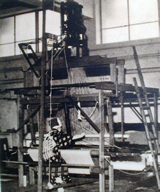
Just as work on Sanada cloth finally got on track, the Sanada cloth textile mill and rice granary were rebuilt in the autumn of 1892 to allow work to begin on the manufacturing of blankets, which was done through the use of a blanket hand loom. It is said that blanket manufacturing was more profitable than Sanada cloth and that it was like a factory in terms of scale.
1918
Fukaki Boseki is established and integrated production of blankets begins("Boseki" means "spinning factory")
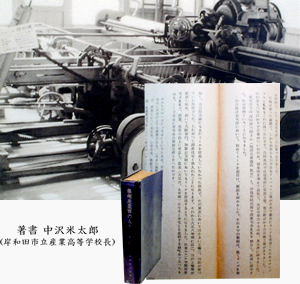
Fukaki Boseki is founded in 1918 next to Otsu Orimono Shiage & Co. Ltd., itself jointly founded to offer finishing processing for blankets, and integrated production of blankets begins. One document records that they were the first in to Japan to introduce mule yarn spinning.
The price of rice rose sharply around this time, and the rice market was in chaos. Large-scale rice riots took place in Toyama Prefecture.
1931
First use of cashmere (Manufacturing of woollen knitting yarn)
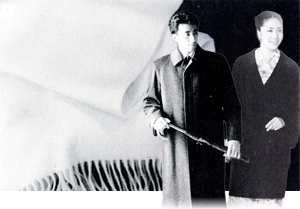
In 1931, the number of spinning machines for thin knitting yarn was increased and production of mixed knitting yarn made from lamb’s wool and cashmere began. The following year, production of cashmere shawls and fabric for overcoats began and in 1933, production of cashmere Japanese-style coats for ladies began.
In this year, Haneda Airfield (current Tokyo International Airport) was opened.
1936
Main woollen fabric factory completed (Kasuga-cho, Izumiotsu). Overcoming a time of many hardships, this factory established the foundation for today’s Fukaki Woollen Textile Co.
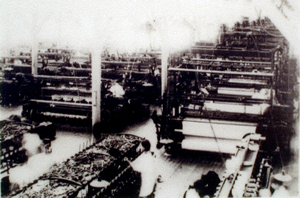
In 1936, the main woollen fabric factory was completed along what is now former National Route 26. This factory established the foundation of our company, making woollen textiles the main business.
The Diet Building in Nagatacho was completed in this year.
1947
Newly built yarn spinning factory (Asahi-cho, Izumiotsu)
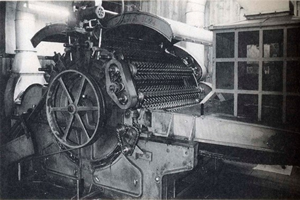
Through forced wartime mergers, the Fukaki Keito Boseki Co. Ltd. name was revived, and a new factory for yarn spinning was built in Asahi-cho on roughly 5,289 square meters of land to the east of Izumiōtsu Station.
The Constitution of Japan was adopted in this year.
1950
The factory is expanded, marking the start of Fukaki Woollen Textile Co., Ltd.
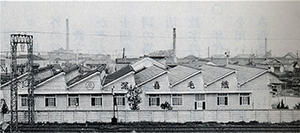
Expansion of the woollen textile and yarn spinning factories was completed in 1950 and Fukaki Keito Boseki Co. Ltd. and Fukaki Woollen Textiles are renamed Fukaki Woollen Textile Co., Ltd., marking the start of this company with its unified operations of spinning and weaving.
1953
Dyeing and sorting factory completed (Itahara-cho, Izumiotsu). Integrated production of woollen textiles begins
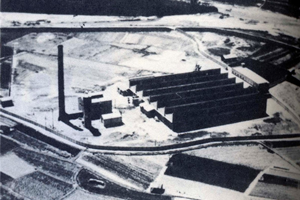
In 1953, a dyeing and sorting factory was built on about 4,000 square meters of current land in Itahara-cho in Izumiotsu city. With this, the modern-day proprietary integrated production system of spinning, weaving, dyeing, and sorting was established.
The Amami Islands were returned to Japan in this year.
1970
Kasuga-cho headquarters and woollen textile factory are moved
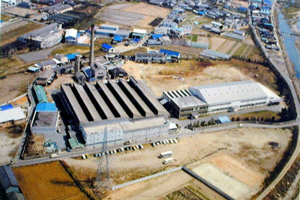
In 1970, the headquarters and woollen textile factory in Kasuga-cho are moved to Itahara-cho, where the dyeing and sorting factory are located.
A world’s fair was held in Japan in March of this year.
1987
100 year anniversary – Publication of The 100 Years of Fukaki Woollen Textiles The Fukaki Human Resource Development Fund is established to train people for the future
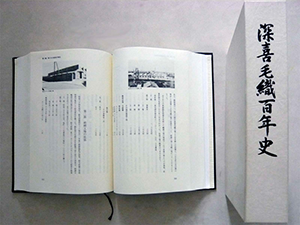
Overcoming many tumultuous times, in 1987, we celebrated our 100 year anniversary. With the goal of training future human resources in Izumiotsu city, the Fukaki Human Resource Development Fund was established with donations given in commemoration of this milestone. We also published The 100 Years of Fukaki Woollen Textiles as proof of our century-spanning history.
Construction began in anticipation of the opening of Kansai International Airport this year.
1998
Joined CCMI (Cashmere and Camel Hair Manufacturers Institute)
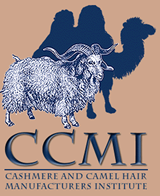
In 1998, we joined CCMI, a renowned international organization among developed nations for cashmere and camel hair.
Quality management system certified to ISO9001
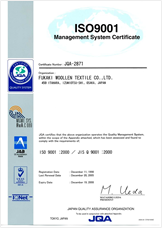
In the same year, our quality management system was certified to ISO9001.
1999
Environmental management system certified to ISO14001
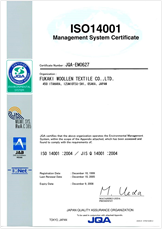
In 1999, our environmental management system was certified to ISO14001.
2000
New woollen spinning factory built on grounds of Itahara-cho headquarters
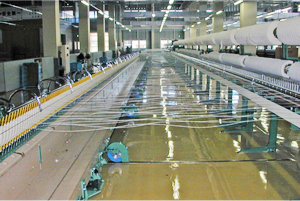
In 2000, a woollen spinning factory was newly built on the grounds of the headquarters in Itahara-cho, and with this, a unified woollen textile factory was completed on a single site.
Switch from heavy oil to gas
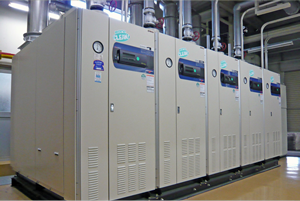
In the same year, we switched our primary energy used for heating from heavy oil to gas in consideration of the environment and to reduce costs.
NEDO selected as an associate for FY 2000 field test business for industry(NEDO:New Energy and Industrial Technology Development Organization)
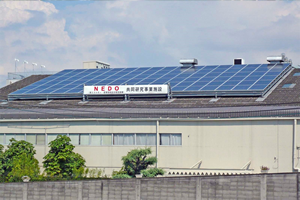
We were selected the New Energy and Industrial Technology Development Organization, an external organization of the Ministry of Economy, Trade and Industry, as an associate for the FY 2000 field test business for industry. Rare at the time, we established a power generation system with a maximum output of 30 kW using 102 German-made 300 W solar cell modules made of polycrystal silicon.
2004
Occupational health and safety management system certified to OHSAS18001
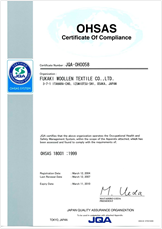
In 2004, our occupational health and safety management system was certified to OHSAS18001 after our work environment was praised for being people-friendly.
2010
Start of joint venture with CHI FENG SUNRISE FUKAKI CASHMERE CO., LTD.

2023
Voluntarily Relinquishing ISO 9001, 14001, and 45001 Certifications and Transitioning to Independent Operations
In 1998 (Heisei 10), we obtained ISO 9001 certification, and subsequently, over the course of more than 20 years, we acquired ISO 14001 and OHSAS 18001 certifications [transitioned to ISO 45001 in 2019 (Reiwa 1)]. We have built our management systems based on these various standards, focusing on business quality, environmental preservation, and occupational health and safety, while making continuous improvements. However, as we have determined that the initial objectives of certification have permeated within the organization and employee awareness has significantly increased, we have decided to voluntarily relinquish our certifications effective November 2023 (Reiwa 5).
Regarding the future, we plan to build upon the management system we have established and operated thus far, transitioning to our own independent operations. In our efforts to fulfill our corporate social responsibility, we are committed to making even greater efforts in improvements and related activities in our business operations.
